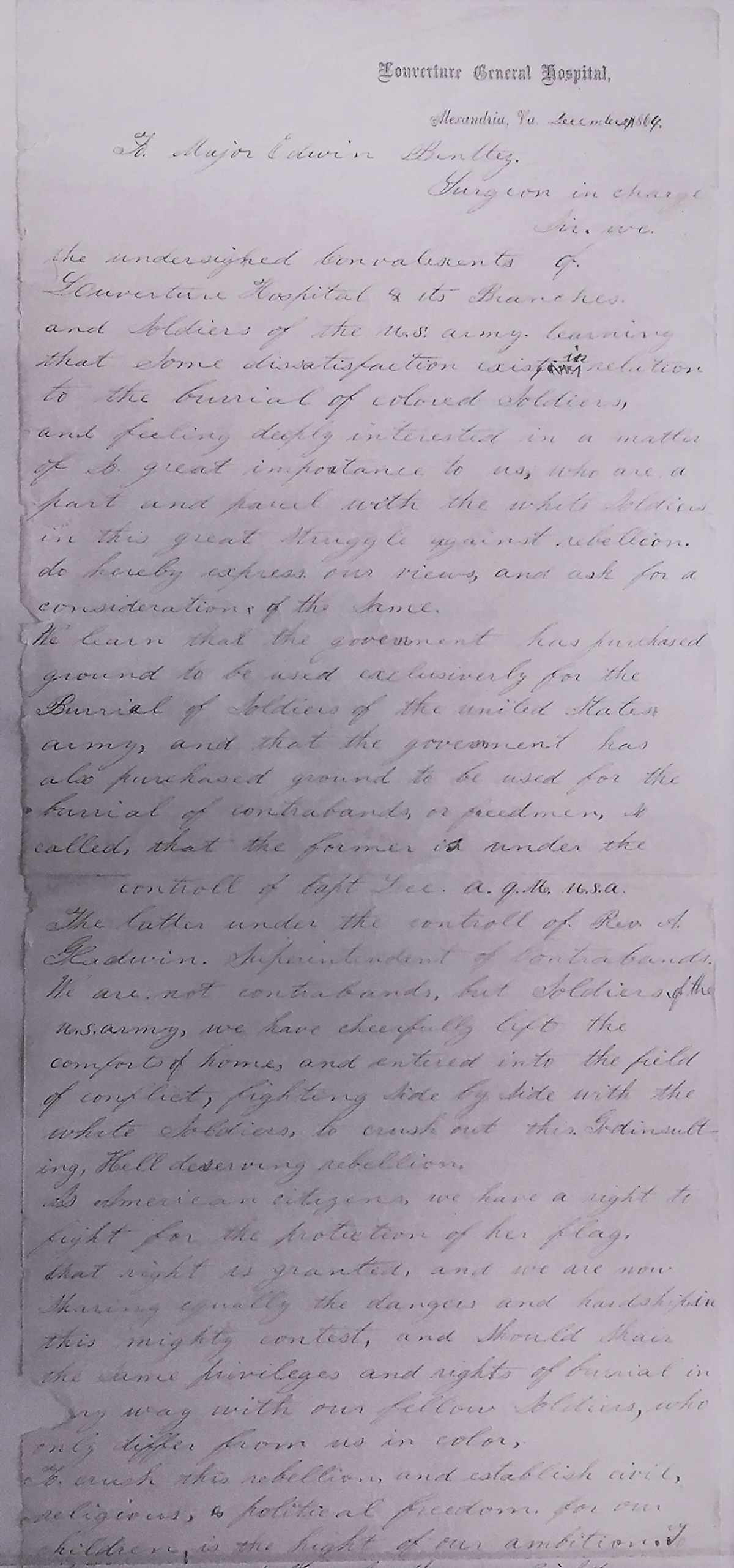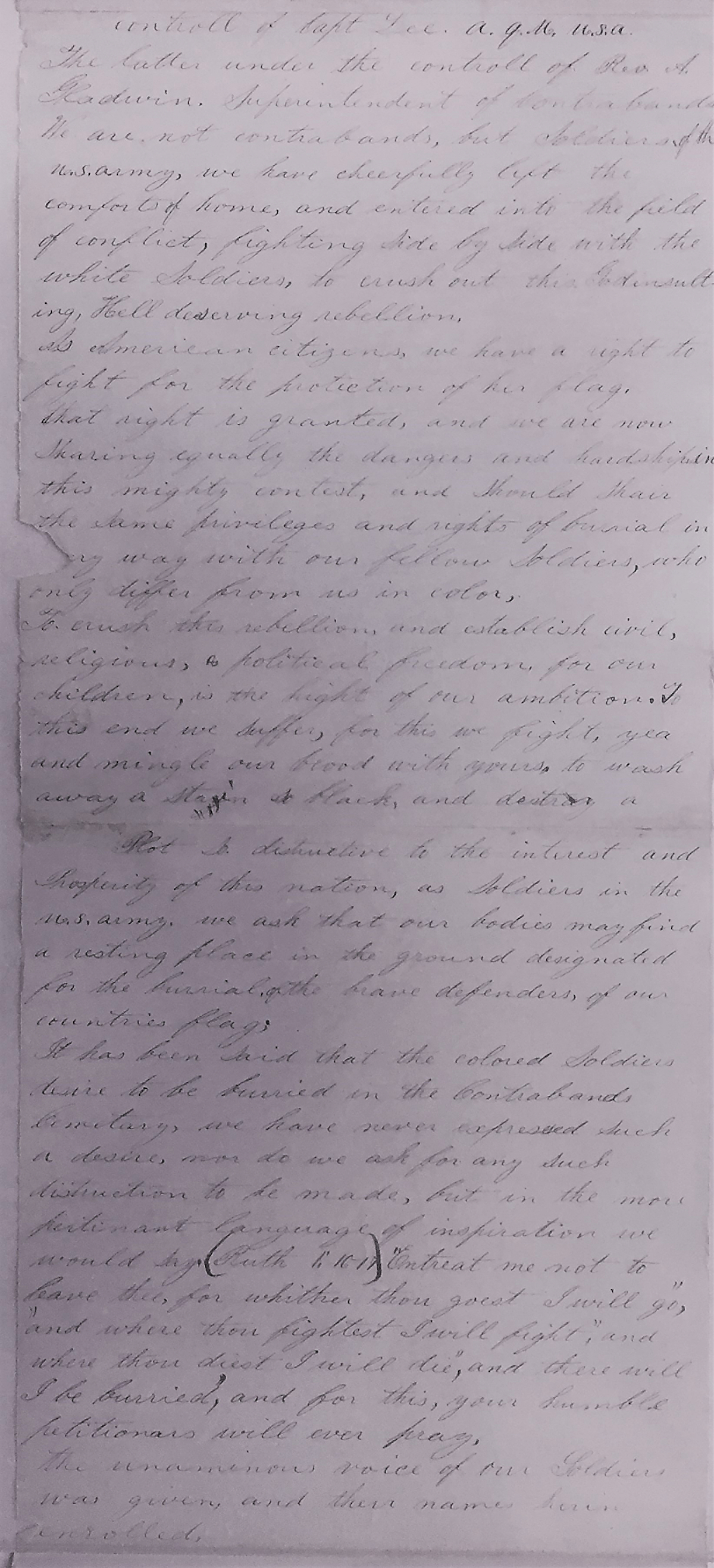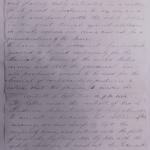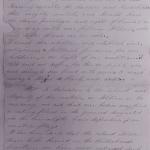

"Convalescents of Louverture Hospital Petition," Letter, Dec. 27, 1864, [Entry 576], [RG 92], National Archives and Records Administration, Washington, DC.
"Convalescents of Louverture Hospital Petition," Letter, Dec. 27, 1864, [Entry 576], [RG 92], National Archives and Records Administration, Washington, DC.
To Major Edwin Bentley,
Surgeon In Charge
Sir, we the undersigned Convalescents of Louverture Hospital & its Branches and soldiers of the U.S. army, learning that some dissatisfaction exists in relation to the burrial of colored soldiers, and feeling deeply interested in a matter of so great importance to us, who are a part and parcel with the white soldiers in this great struggle against rebellion, do hereby express our views, and ask for a consideration of the same.
We learn that the government has purchased ground to be used exclusively for Burrial of soldiers of the United States Army, and that the government has also purchased ground to be used for the burial of contrabands, or freedmen, so called, that the former is under the controll of Capt Lee, A.Q.M. U.S.A. The latter under the controll of Rev. A. Gladwin, Superintendent of Contrabands. We are not contrabands, but soldiers of the U.S. Army, we have cheerfully left the comforts of home, and entered into the field of conflict, fighting side by side with the white soldiers, to crush out this God insulting, Hell deserving rebellion.
As American citizens, we have a right to fight for the protection of her flag, that right is granted, and we are now sharing equally the dangers and hardships in this mighty contest, and should shair the same privileges and rights of burial in every way with our fellow soldiers, who only differ from us in color,
To crush this rebellion, and establish civil, religious, & political freedom for our children, is the hight of our ambition. To this end we suffer, for this we fight, yea and mingle our blood with yours, to wash away a stain so black, and destroy a Plot so destructive to the interest and Properity of this nation, as soldiers in the U.S. Army. We ask that our bodies may find a resting place in the ground designated for the burial of the brave defenders, of our countries flag;
It has been said that the colored soldiers desire to be burried in the Contrabands Cemetary, we have never expressed such a desire, nor do we ask for any such distinction to be made, but in the more pertinant language of inspiration we would say, (Ruth 1:16-17) “Entreat me not to leave thee, for whither thou goest I will go” “and where thou fightest I will fight,” and where thou diest I will die,” and there will I be burried,” and for this, your humble petitionars will ever pray, the unaminous voice of our Soldiers was given, and their names herin enrolled,
Patients' Petition
Adding more voices to the debate over burials, in December 1864 patients from the nearby L’Ouverture Hospital wrote, signed, and sent a petition asking to be buried in the national military cemetery in Alexandria. Contrary to the narrative that Reverend Gladwin had created-- that all of the African Americans in Alexandria wanted to be buried in the Freedmen’s Cemetery-- the Colored Troops’ petition emphasized the opposite.
In their own words, they referred to themselves as American citizens and requested the same rights that white soldiers received. This became one of the first organized civil rights protests in the United States. The Surgeon-In-Charge forwarded the letter to Captain Lee, who finally sent it to Quartermaster General Montgomery Meigs. His decision would determine the policy for Alexandria and all other U.S. military cemeteries.

